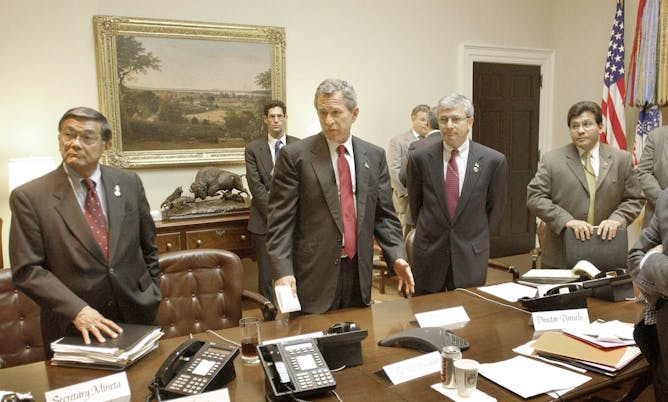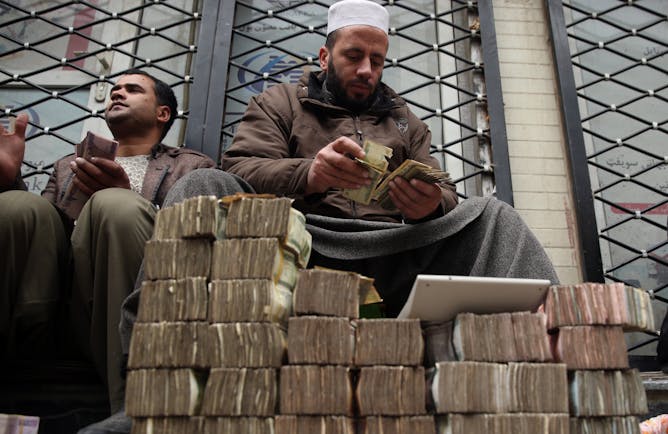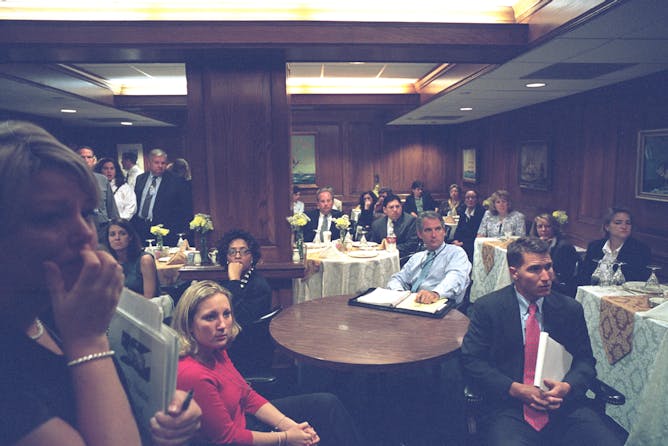|
We pride ourselves at The Conversation on providing readers with context – or what journalists sometimes call the “back story.” And this week, we have the back story to end all back stories.
As a child, Norm Mineta was incarcerated under harsh conditions with his Japanese American family in a detention camp in Wyoming after Japan’s bombing of Pearl Harbor. “When he boarded a train with his family for an unknown destination, Mineta was wearing his Cub Scout uniform to show his patriotism,” writes scholar Susan H. Kamei of USC Dornsife College of Letters, Arts and Sciences.
Years later, Mineta became a congressman, President Bill Clinton’s secretary of commerce and President George W. Bush’s secretary of transportation. In the spring of 2001, writes Kamei, “Bush had invited Mineta and his wife, Deni, to spend time at Camp David, the presidential retreat. One night after dinner, the president asked Mineta about his imprisonment during World War II. For three hours, Mineta … shared his experience of wartime detention and its effects on him and his family.”
That story was a crucial element, Kamei writes, in how Bush handled calls for rounding up and detaining Muslims and Arab Americans after the 9/11 attacks. Read the story, “How memories of Japanese American imprisonment during WWII guided the US response to 9/11,” for the breathtaking moment when Bush, citing Mineta’s WWII incarceration, lays out how the U.S. government will respond.
|

On Sept. 17, 2001, Transportation Secretary Norman Mineta, left, met with President George W. Bush and others.
Greg Mathieson/Mai/Getty Images
Susan H. Kamei, USC Dornsife College of Letters, Arts and Sciences
In the wake of 9/11, some called for rounding up whole groups of people viewed as potential threats to the nation. But Transportation Secretary Norman Mineta knew the U.S. had done that before.
|

Afghanistan relies on informal money changers more than banks.
AP Photo/Massoud Hossaini
Hanif Sufizada, University of Nebraska Omaha
The Taliban have at least five significant potential sources of revenue as they begin to govern Afghanistan again.
|

Staff members were rushed into the White House Mess – then rushed out when they were told a plane was heading for the White House.
Tina Hager/George W. Bush Presidential Center
Anita McBride, American University
A top White House aide to President George W. Bush recounts what 9/11 was like for White House staffers.
|
|
|
-
Saif Shahin, American University
Concern about Islamophobia has been near-constant for years. But how it plays out is changing – especially online.
-
Jeremy Stoddard, University of Wisconsin-Madison; Diana Hess, University of Wisconsin-Madison
The 20th anniversary of the Sept. 11 attacks is an opportunity for teachers to focus less on recreating the day and more on what students can learn from it, two curriculum experts argue.
-
Paul Shafer, Boston University; Alex Hoagland, Boston University
The Affordable Care Act has allowed many preventive health services, including cancer screenings and vaccines, to be free of charge. But legal challenges may lead to costly repercussions for patients.
-
Joan Fitzgerald, Northeastern University; Julian Agyeman, Tufts University
Two urban policy experts explain why taking down highways that have isolated low-income and minority neighborhoods for decades is an important part of the pending infrastructure bill.
-
Christopher Justin Einolf, Northern Illinois University
Interviews with former torturers in Saddam Hussein’s regime in Iraq reveal what it takes to be a torturer – which could help explain how to reduce the number of people who get tortured around the world.
|
|